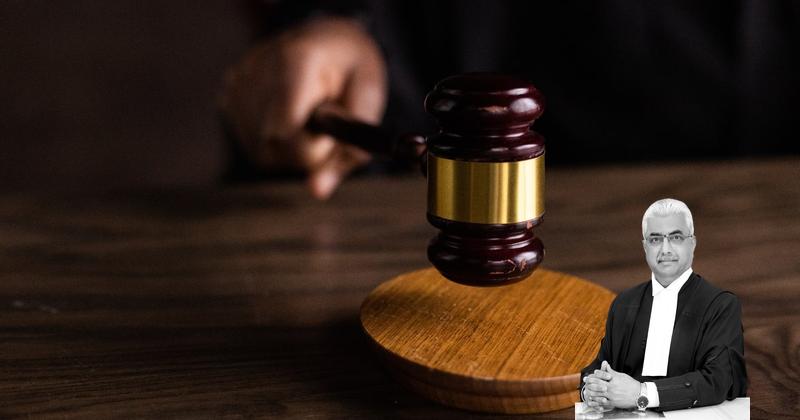These two appeals are directed against the judgment and final order dated 05.10.2010 passed by the High Court of Andhra Pradesh at Hyderabad (hereinafter referred to as ‘High Court’ ) in Appeal Suit No 45 of 2008 filed by Respondent No 1 herein against the judgment and decree dated 22.08.2007 passed by the Additional Senior Civil Judge, Ongole (hereinafter referred to as ‘Trial Court’ ) in O.S. Venugopala Rao executed an agreement of sale with Respondent No 1 herein, whereby he agreed to sell the aforementioned suit schedule property measuring Ac. Venugopala Rao agreed to execute the sale deed in favour of Respondent No 1 after demarcating the land and receiving the balance sale consideration within three months. Venugopala Rao issued a notice dated 02.01.2003 to Respondent No 1 herein, demanding the balance consideration of Rs. Venugopala Rao was asked to get the property measured, get its attachment removed, following which Respondent No 1 herein would pay the balance sale consideration and get the property registered in her name.
It was further stated that Respondent No 1 3 herein may deposit an amount of Rs.
Also Read: https://newslaw.in/supreme-court/modification-of-final-order-for-placement-of-sale-proceeds/
Koteswara Rao (husband of Respondent No 3 herein), respectively.
Venugopala Rao’s death on 13.05.2003, Kalluri Kondaiah and M. In the notice, it was stated that Respondent No 1 has always been ready and willing to perform her part of the contract by paying the balance sale consideration, and that the legal heirs of the deceased G. Based on the pleadings of the parties, the Trial Court framed the following issues for consideration: (a) Whether the Plaintiff is entitled for relief of specific performance of sale agreement? Subsequently, ASMP
No 2292 of 2010 was filed before the High Court on behalf of the minor Appellants herein by their maternal grandmother, seeking recall of the judgment dated 05.10.2010 in Appeal Suit No 45 of 2008 on the ground that the Appellants were not heard. The High Court noted that there was no representation on behalf of the Appellants despite being given multiple opportunities, following which judgment was delivered on merits. Sirajuddin, learned Senior Counsel appearing on behalf of the Appellants contended that the High Court erred in allowing the appeal filed by Respondent No 1 herein (Plaintiff) and decreeing the suit for specific performance.
Also Read: https://newslaw.in/case-type/civil/land-resumption-and-annulment-setting-aside-impugned-orders/
However, in the present case, except the two-line pleading that the Plaintiff (Respondent No 1herein) was ever ready and willing to perform her part of the contract, there are no other details to show her readiness and 1 1995 (5) SCC 115 7 willingness. Venugopala Rao had performed his part of obligation, while Respondent No 1 failed to perform her part of the agreement with regard to the payment of balance sale consideration within three months as stipulated by the agreement.
Venugopala Rao’s rejoinder notice, the Plaintiff (Respondent No 1 herein) did not pay the balance sale consideration and remained silent for 14 months, and when the price of the property had increased substantially, she gave another legal notice to the deceased G. The Trial Court had specifically held that the suit cannot be decreed in the absence of a necessary party, but the High Court ignored this aspect.
Balsa Allvelu Magamma in respect of the remaining 40 Cents, and agreed to sell the entire 90 Cents of land to Respondent No 1herein at the rate of Rs.2200/-per Gadi. The agreement specifically stipulated that the land shall be demarcated within 3 months from the date of agreement, with the boundaries as indicated in the agreement in respect of 90 cents land. The learned Senior Counsel further stated that during trial of the suit, the husband of Respondent No 1 was examined as PW1 and he deposed that he and his wife have sufficient means to pay the balance amount and they were ever ready to perform their part of the contract.
At the outset, we would like to mention that Section 16 (c) of the Specific Relief Act, 1963 (along with its explanation) is the relevant provision of law which is attracted in the present case, and as has also been held by the High Court. Therefore, in the present case, Section 16, as it stood prior to the 2018 Amendment, would be applicable, since the matter dates back to 2002. Explanation.—
For the purposes of clause (c),— (i) where a contract involves the payment of money, it is not essential for the plaintiff to actually tender to the defendant or to deposit in court any money except when so directed by the court; (ii) the plaintiff must aver performance of, or readiness and willingness to perform, the contract according to its true construction.” On a bare perusal of the aforementioned section, it becomes clear that prior to the 2018 Amendment, clause (c) of Section 16 laid down that the plaintiff is entitled for a specific performance of contract if he avers and proves that he has performed or has always been ready and willing to perform his obligation under the contract. The old Specific Relief Act of 1877 did not contain any express provision regarding the averment of readiness and willingness as being necessary in a suit for specific performance, but this was the law of the land.
In the present case, the High Court while discussing Section 16 (c) of the Specific Relief Act, 1963 (hereinafter referred to as ‘Act’ ), observed that it is necessary for the Plaintiff to perform his part of the contract from the date of contract till the date of hearing. Therefore, it was observed that the recitals in the sale agreement coupled with the evidence of PW1 and PW2 shows that the extent of land has to be measured within three months, and unless the land is measured and demarcated, it would be impossible for the Plaintiff to get a sale deed executed, and as such, the question of paying the balance sale consideration does not arise. Gopalakrishna Setty, it was held, “ the language in Section 16 (c) does not require any specific phraseology but only that the plaintiff must aver that he has performed or has always been and is willing to perform his part of the contract. The basic principle behind Section 16(c) read with Explanation (ii) is that any person seeking benefit of the specific performance of contract must manifest that his conduct has been blemishless throughout entitling him to the specific relief. Venugopala Rao or his legal heirs (Defendants in the suit, including the Appellants herein) failed to perform their obligation with regard to the demarcation of the property, while the Plaintiff had established that she was always ready and willing to perform her part of contract by paying the balance sale consideration which is the primary requirement as per Section 16 (c) of the Act. Venugopala Rao failed to measure and demarcate the land, the question of the Plaintiff (Respondent No 1 herein) paying the balance sale consideration does not arise. Chinoy and Chinoy and Company [(1949)
LR 77 IA 76] the Privy Council decreed specific performance of the contract to sell shares.
Kamal Rani, it was reiterated that in sale of immovable property there is no presumption that time is the essence of the contract, however, the court may infer performance in a reasonable time if the conditions are evident from the express terms of the contract, from the nature of the property, and from the surrounding circumstances.
Case Title: GADDIPATI DIVIJA Vs. PATHURI SAMRAJYAM (2023 INSC 385)
Case Number: C.A. No.-004206-004207 / 2011



